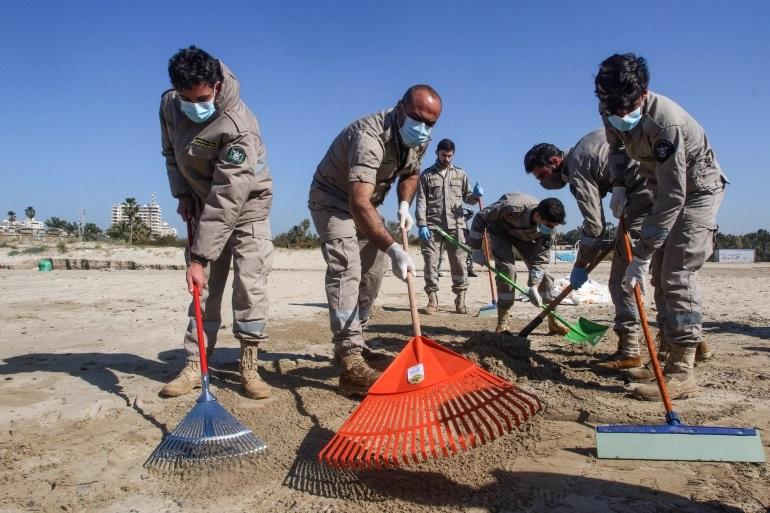Volunteers from youth associations clean a contaminated beach in the southern Lebanese city of Tyre on February 27, 2021, following last week's offshore oil spill that drenched the northern Israeli coastline and reached parts of the neighbouring Lebanese beaches. photo:AFP
By Patryk Krych | The World Daily | FEBRUARY 28th 2021
Following a disastrous oil spill that took place on Saturday, volunteers have taken to cleaning the beaches of Lebanon as well as aiding the many turtles, fish, and birds that have been covered in the toxic substance as a result.
Several volunteers had been reportedly hospitalised after inhaling the fumes of the oil on Lebanese beaches, following an oil spill linked with a leaking oil tanker off the Israeli coast. The spill had spread to Lebanese beaches fairly quickly, requiring prompt clean-up as it quickly began to have visibly negative effects on the surrounding wildlife.
“We will begin to remove the tar spots starting from the reserve coast, and hundreds of volunteers will help in the cleaning operation,” said Mouin Hamze, director of the Tyre Coast Nature Reserve where the clean-up is taking place, and head of the National Council for Scientific Research.
The reserve is considered rather important, being one of Lebanon’s few remaining sandy beaches as well as a nesting ground for the endangered loggerhead and green sea turtles. Not only these, as the sand also serves as a shelter for the Arabian spiny mouse species.
If the spill isn’t handled appropriately and quickly, the maritime disaster may worsen to a biodiverse level. Especially when there are endangered species at risk. “The nature reserve is suffering from approximately 2 tonnes of tar, 90 percent of which is hidden under the sand,” he added.
The leak had occurred over a week ago, but a storm had worsened the spread of the crisis and soon made it difficult to control. The result was the sticky, tar-like substance drifting out of Israel and into the Lebanese territories where it endangers critical wildlife.
“The Tyre reserve has been hit by about two tons of tar, 90 percent of which is now hidden in the sand,” Hamze told the AFP news agency. As a result, he stressed that the overall clean-up may well last up to two more weeks.
Hamze fears that pollution and oil may well continue to wash up onto the shares of Lebanon for three more months if not more, due to the severity of the oil spill in Israel, which Israeli environmentalists have referred to as potentially “the next ecological disaster.”
“This is a hazard of a magnitude we have not seen in years. We are doing everything in order to find those responsible for the destruction, and are preparing for the difficult and long task of rehabilitating the beaches and preventing further injury to animals,” said Israel’s Minister of Environmental Protection Gila Gamliel, back when reports of the spill had first broken out.






